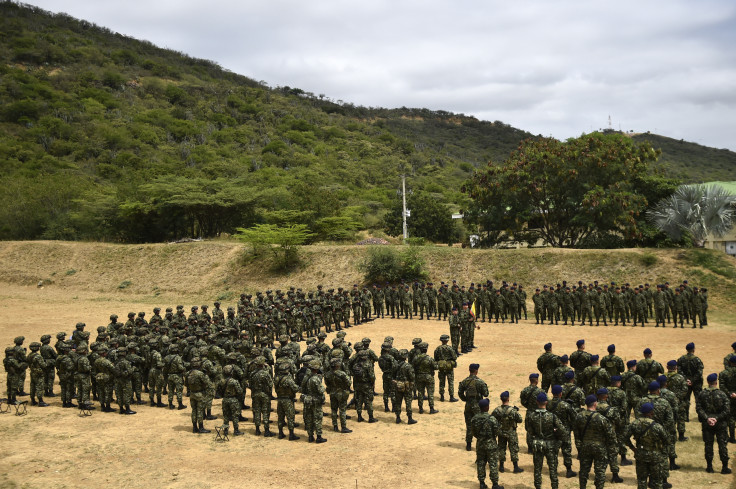
President Donald Trump's executive order freezing foreign aid has dealt a blow to Colombia's military and police, weakening its ability to counter armed groups and drug trafficking organizations, according to conflict and risk analysts.
Following the freeze, the U.S. Embassy mandated the grounding of a significant portion of Colombia's Blackhawk helicopter fleet and paused private military contracts.
Security analysts told The Latin Times that the move jeopardizes Colombia's ongoing offensive against drug trafficking groups and undermines its emergency response to the country's worst humanitarian crisis in a decade.
On January 30, army and police officials told Colombian media that they had been instructed by the U.S. Embassy to ground dozens of helicopters due to Trump's aid freeze.
The move was the result of an executive order signed by Trump's during the first 24 hours of his term. The act, titled "Reevaluating and Realigning United States Foreign Aid," paused most U.S. foreign development assistance for 90 days.
As a result, 18 of the Colombian National Police's Blackhawk fleet, used in counter-narcotics operations, were grounded. An additional 12 army aircraft of the same class were rendered non-operational as well.
Many of these helicopters belong to the United States and had been on loan to Colombian security forces. Other aircraft belonging to Colombia were grounded because they relied on U.S. contracts to maintain the fleet, which were also paused.
The military assistance freeze triggered alarm in Bogotá last Thursday, where an emergency meeting was held to consider alternative options.
Elizabeth Dickinson, Senior Colombia Analyst at International Crisis Group, explained the magnitude of the situation. "It's really hard to overstate the impact of this. This is really significant... " she told The Latin Times.
Dickinson explained that given Colombia's complex terrain, the helicopters are fundamental to deploying soldiers in rural areas and delivering supplies. These remote areas tend to be where armed groups and drug trafficking organizations are located.
She also noted that the funding freeze affects more than just aerial operations.
"[The moratorium] also includes a significant amount of support to intelligence operations from the police and other parts of the security apparatus that now are essentially paralyzed or scrambling to reallocate funds from different parts of the Ministry of Defense," she said.
Dickinson added that the funding freeze could not come at a worse time for the country.
"It's just worth remembering that this is happening in a moment when Colombia is facing arguably one of the deepest security crises since the 2016 peace agreement," she noted.
The Colombian government has been scrambling to reallocate resources to support its ongoing offensive in the remote northeast Catatumbo region, where the President declared a state of emergency in January following fighting between two armed groups over a key drug trafficking region.
Even before the funding freeze, the state was forced to borrow aircraft from the country's largest oil company, Ecopetrol, to continue to provide aerial support for both military and humanitarian assistance operations.
Sergio Guzmán, Director of Colombia Risk Analysis, stressed the impact of the funding freeze not only on Colombia, but also on the United States.
"I think the most important thing to say is that the United States needs to acknowledge that the stop work order on critical tasks is a huge shot in the foot, in its own foot," Guzmán told The Latin Times.
The analyst believes that the move will be counter-productive to Trump's flagship policies of cracking down on drug trafficking and migrant smuggling gangs.
"This will carry very, very deep consequences and particularly strengthen U.S. adversaries in the region, especially drug trafficking organizations and criminal groups who are not stopping work, who are continuing their criminal offenses and who are mustering to continue harming the United States and its interests, both at home and abroad," warned Guzmán.
The analyst also noted that Colombia, which has for decades depended on Washington as its key military ally, has no alternative options for assistance.
"It's difficult to see Europeans or other Latin Americans stepping in and China's not going to do it either," said Guzmán.
For now, Colombia's government has been left to counteract complex security threats and drug trafficking gangs alone.
The long-term consequences for the region and for the United States' alliances within it could be far-reaching.
"I'm not sure exactly what the next move is, but this clearly doesn't help the U.S. make any friends in this very, very complicated landscape that is the security situation in the hemisphere," Guzmán concluded.
© 2025 Latin Times. All rights reserved. Do not reproduce without permission.




